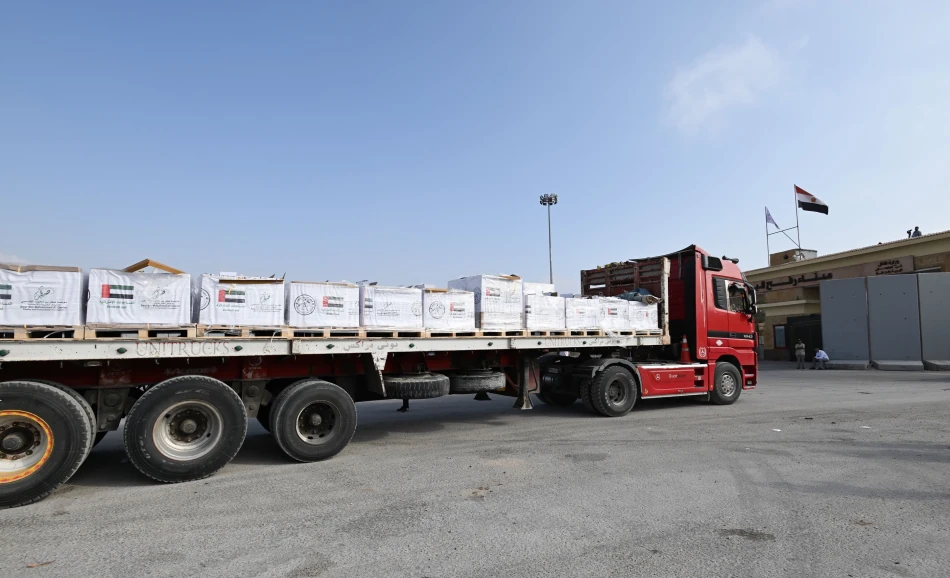
Emirati Humanitarian Aid Convoy of 38 Trucks Reaches Gaza as Part of 'Operation Gallant Knight 3'
UAE Accelerates Gaza Relief Efforts with Major Water Infrastructure Project
The United Arab Emirates has significantly expanded its humanitarian response to Gaza's crisis, delivering 38 trucks of aid through Egypt's Rafah crossing while advancing construction of a critical 7-kilometer water pipeline. The project, part of "Operation Gallant Knight 3," will connect a UAE-built desalination plant in Egypt to displacement areas between Rafah and Khan Younis, providing 2 million gallons of fresh water daily to Palestinian civilians.
Infrastructure Over Aid: A Strategic Shift
Unlike traditional humanitarian responses that focus primarily on food and medical supplies, the UAE's latest convoy demonstrates a more strategic approach to crisis relief. Of the 38 trucks that entered Gaza, 18 carried conventional aid including food, medicine, and infant formula. However, the remaining 20 trucks transported pipes, tanks, and equipment specifically designed for the water infrastructure project.
This represents a notable evolution in Gulf state humanitarian policy—moving beyond immediate relief toward sustainable infrastructure that could serve Gaza's population long after the current crisis subsides. The water pipeline project required 45 trucks total, with yesterday's 25-truck convoy completing the equipment delivery phase.
Engineering Under Fire
The technical achievement of constructing a 7-kilometer water pipeline in an active conflict zone cannot be understated. The UAE's approach mirrors successful infrastructure diplomacy seen in other crisis regions, where countries like Turkey and Qatar have built lasting influence through major construction projects rather than temporary aid drops.
Multi-Modal Relief Strategy
The UAE has simultaneously resumed its "Birds of Goodness" aerial aid drops alongside the ground convoys, creating multiple supply channels that reduce dependency on any single delivery method. This diversified approach reflects lessons learned from previous humanitarian crises where border closures or security concerns disrupted single-channel aid flows.
The timing suggests coordination with Egyptian authorities, who control the Rafah crossing and have historically managed aid flows carefully to balance humanitarian needs with security concerns. Egypt's cooperation in allowing both the desalination plant construction and pipeline materials transit indicates broader regional alignment on Gaza relief efforts.
Regional Implications
The UAE's substantial infrastructure investment in Gaza relief positions the country as a key humanitarian actor in the Palestinian territories, potentially influencing future reconstruction efforts. This approach contrasts with other regional powers who have focused primarily on financial aid or political mediation.
The 2-million-gallon daily water capacity represents a significant portion of Gaza's water needs, potentially reducing the territory's dependence on existing infrastructure that has been damaged or destroyed. For a population facing severe water shortages, this UAE-funded pipeline could become a critical lifeline extending well beyond the immediate crisis period.
The project also demonstrates how Gulf states are leveraging their financial resources and engineering capabilities to address humanitarian crises through sustainable infrastructure rather than temporary relief measures—a model that could influence international aid strategies in other conflict zones.
Most Viewed News

 Sara Khaled
Sara Khaled






